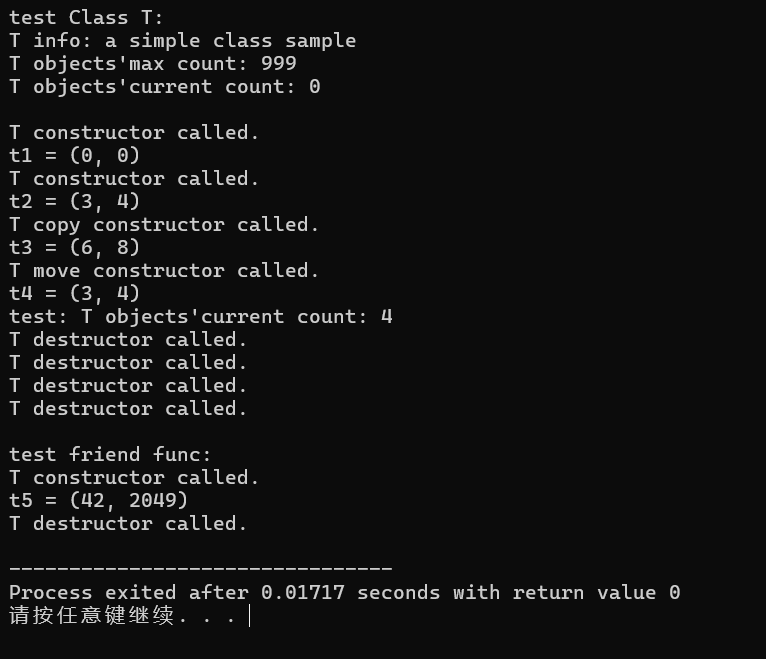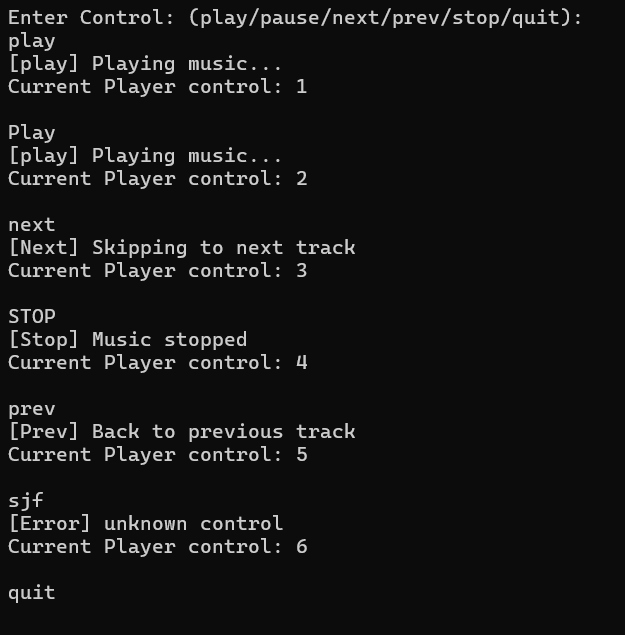实验二
任务1:
源代码 :
T.h
#pragma once #include <string> // 类T: 声明 class T { // 对象属性、方法 public: T(int x = 0, int y = 0); // 普通构造函数 T(const T &t); // 复制构造函数 T(T &&t); // 移动构造函数 ~T(); // 析构函数 void adjust(int ratio); // 按系数成倍调整数据 void display() const; // 以(m1, m2)形式显示T类对象信息 private: int m1, m2; // 类属性、方法 public: static int get_cnt(); // 显示当前T类对象总数 public: static const std::string doc; // 类T的描述信息 static const int max_cnt; // 类T对象上限 private: static int cnt; // 当前T类对象数目 // 类T友元函数声明 friend void func(); }; // 普通函数声明 void func();
T.cpp
#include "T.h" #include <iostream> #include <string> // 类T实现 // static成员数据类外初始化 const std::string T::doc{"a simple class sample"}; const int T::max_cnt = 999; int T::cnt = 0; // 类方法 int T::get_cnt() { return cnt; } // 对象方法 T::T(int x, int y): m1{x}, m2{y} { ++cnt; std::cout << "T constructor called.\n"; } T::T(const T &t): m1{t.m1}, m2{t.m2} { ++cnt; std::cout << "T copy constructor called.\n"; } T::T(T &&t): m1{t.m1}, m2{t.m2} { ++cnt; std::cout << "T move constructor called.\n"; } T::~T() { --cnt; std::cout << "T destructor called.\n"; } void T::adjust(int ratio) { m1 *= ratio; m2 *= ratio; } void T::display() const { std::cout << "(" << m1 << ", " << m2 << ")" ; } // 普通函数实现 void func() { T t5(42); t5.m2 = 2049; std::cout << "t5 = "; t5.display(); std::cout << '\n'; }
task1.cpp
#include "T.h" #include <iostream> void test_T(); int main() { std::cout << "test Class T: \n"; test_T(); std::cout << "\ntest friend func: \n"; func(); } void test_T() { using std::cout; using std::endl; cout << "T info: " << T::doc << endl; cout << "T objects'max count: " << T::max_cnt << endl; cout << "T objects'current count: " << T::get_cnt() << endl << endl; T t1; cout << "t1 = "; t1.display(); cout << endl; T t2(3, 4); cout << "t2 = "; t2.display(); cout << endl; T t3(t2); t3.adjust(2); cout << "t3 = "; t3.display(); cout << endl; T t4(std::move(t2)); cout << "t4 = "; t4.display(); cout << endl; cout << "test: T objects'current count: " << T::get_cnt() << endl; }
运行结果截图:

问题1:
T.h中,在类T内部,已声明 func 是T的友元函数。在类外部,去掉line36,重新编译,程序能否正常运行。
如果能,回答YES;如果不能,以截图形式提供编译报错信息,说明原因。
YES
问题2:
T.h中,line9-12给出了各种构造函数、析构函数。总结它们各自的功能、调用时机。
T(int x = 0, int y = 0);功能:用于在创建T类的对象时,对类的成员变量进行初始化;调用时机:在创建T类变量并传达参数时调用,若传递的变量不足是,用默认值初始化。
T(const T &t);功能:用已存在的T类变量初始化新创建的T类变量;调用时机:创建T类变量时传递的参数为T的引用类型时调用。
T(T &&t);功能:将一个T类的变量里的资源移动至新创建的T类变量;调用时机:当发生右值传递时调用。
~T(); 功能:当创建的T类对象被销毁时,释放该对象所占用的资源;调用时间:当类对象超出其作用域时调用。
问题3:
T.cpp中,line13-15,剪切到T.h的末尾,重新编译,程序能否正确编译。如不能,以截图形式给出报错信息,分析原因。
不能。

这个错误是链接错误。表示编译器能找到变量的声明,但找不到它们的定义;在 C++ 中,静态成员变量的规则是:要在类内声明,且必须在类外(全局作用域)定义,否则链接时会找不到定义。
任务2:
源代码:
Complex.h
#pragma once #include <string> class Complex{ public: Complex(double a = 0,double b = 0); Complex(const Complex &c); ~Complex(); private: double real, imag; public: double get_real() const; double get_imag() const; void add(const Complex &c) ; public: static const std::string doc; friend void output(); friend double abs(); friend Complex add(); friend bool is_equal(); friend bool is_not_equal(); }; void output(const Complex &c); double abs(const Complex &c); Complex add(const Complex &c1, const Complex &c2); bool is_equal(const Complex &c1, const Complex &c2); bool is_not_equal(const Complex &c1, const Complex &c2);
Complex.cpp
#include "Complex.h" #include <iostream> #include <string> #include <cmath> const std::string Complex::doc{"a simplified complex class"}; Complex::Complex(double a, double b){ real = a; imag = b; } Complex::Complex(const Complex &c){ real = c.real; imag = c.imag ; } Complex::~Complex(){ } double Complex::get_real() const{ return real; } double Complex::get_imag()const{ return imag; } void Complex::add(const Complex &c) { real += c.real ; imag += c.imag ; } void output(const Complex &c){ if(c.get_imag() >= 0) std::cout << c.get_real() << " + " << c.get_imag() << "i" << std::endl; else std::cout << c.get_real() << " - " << abs(c.get_imag())<< "i" << std::endl; } double abs(const Complex &c){ return sqrt(c.get_real()*c.get_real() + c.get_imag()*c.get_imag()); } Complex add(const Complex &c1, const Complex &c2){ Complex c(c1.get_real()+c2.get_real() ,c1.get_imag()+c2.get_imag()); return c; } bool is_equal(const Complex &c1, const Complex &c2){ if(c1.get_real() == c2.get_real() && c1.get_imag() == c2.get_imag()) return true; else return false; } bool is_not_equal(const Complex &c1, const Complex &c2){ if(c1.get_real() == c2.get_real() && c1.get_imag() == c2.get_imag()) return false; else return true; }
task2.cpp
#include "Complex.h" #include <iostream> #include <iomanip> #include <complex> void test_Complex(); void test_std_complex(); int main() { std::cout << "*******测试1: 自定义类Complex*******\n"; test_Complex(); std::cout << "\n*******测试2: 标准库模板类complex*******\n"; test_std_complex(); } void test_Complex() { using std::cout; using std::endl; using std::boolalpha; cout << "类成员测试: " << endl; cout << Complex::doc << endl << endl; cout << "Complex对象测试: " << endl; Complex c1; Complex c2(3, -4); Complex c3(c2); Complex c4 = c2; const Complex c5(3.5); cout << "c1 = "; output(c1); cout << endl; cout << "c2 = "; output(c2); cout << endl; cout << "c3 = "; output(c3); cout << endl; cout << "c4 = "; output(c4); cout << endl; cout << "c5.real = " << c5.get_real() << ", c5.imag = " << c5.get_imag() << endl << endl; cout << "复数运算测试: " << endl; cout << "abs(c2) = " << abs(c2) << endl; c1.add(c2); cout << "c1 += c2, c1 = "; output(c1); cout << endl; cout << boolalpha; cout << "c1 == c2 : " << is_equal(c1, c2) << endl; cout << "c1 != c2 : " << is_not_equal(c1, c2) << endl; c4 = add(c2, c3); cout << "c4 = c2 + c3, c4 = "; output(c4); cout << endl; } void test_std_complex() { using std::cout; using std::endl; using std::boolalpha; cout << "std::complex<double>对象测试: " << endl; std::complex<double> c1; std::complex<double> c2(3, -4); std::complex<double> c3(c2); std::complex<double> c4 = c2; const std::complex<double> c5(3.5); cout << "c1 = " << c1 << endl; cout << "c2 = " << c2 << endl; cout << "c3 = " << c3 << endl; cout << "c4 = " << c4 << endl; cout << "c5.real = " << c5.real() << ", c5.imag = " << c5.imag() << endl << endl; cout << "复数运算测试: " << endl; cout << "abs(c2) = " << abs(c2) << endl; c1 += c2; cout << "c1 += c2, c1 = " << c1 << endl; cout << boolalpha; cout << "c1 == c2 : " << (c1 == c2)<< endl; cout << "c1 != c2 : " << (c1 != c2) << endl; c4 = c2 + c3; cout << "c4 = c2 + c3, c4 = " << c4 << endl; }
问题1:
比较自定义类 Complex 和标准库模板类 complex 的用法,在使用形式上,哪一种更简洁?函数和运算内在有关
联吗?
从形式上,标准库模板类complex的用法更符合日常的逻辑习惯,比较简洁。函数和运算内在有关联,函数的功能和运算的内在逻辑十分相似。
问题2:
2-1:自定义 Complex 中, output/abs/add/ 等均设为友元,它们真的需要访问 私有数据 吗?
需要,output/abs/add/等均需对私有数据进行一定的操作,必须要访问私有数据。
2-2:标准库 std::complex 是否把 abs 设为友元?
在标准库std::complex 中,abs 不是 std::complex 的友元函数。std::abs是一个模板函数,用于计算 std::complex 等类型的绝对值(模),它是标准库中的独立函数,而不是类的友元函数。
2-3:什么时候才考虑使用friend?
当我想要使用某个函数对类的私有数据进行操作,而该函数又不是类的成员函数,无法直接访问私有函数时,可以将该函数设为类的友元函数。
问题3:
如果构造对象时禁用=形式,即遇到 Complex c4 = c2; 编译报错,类Complex的设计应如何调整?
Complex c4 = c2; 为拷贝构造函数,可以将其设为私有函数,在遇到运算符“=”时,外部操作无法直接操作。
任务3:
源代码:
PlayerControl.h
#pragma once #include <string> enum class ControlType {Play, Pause, Next, Prev, Stop, Unknown}; class PlayerControl { public: PlayerControl(); ControlType parse(const std::string& control_str); // 实现std::string --> ControlType转换 void execute(ControlType cmd) const; // 执行控制操作(以打印输出模拟) static int get_cnt(); private: static int total_cnt; };
PlayerControl.cpp
#include "PlayerControl.h" #include <iostream> #include <algorithm> int PlayerControl::total_cnt = 0; PlayerControl::PlayerControl() {} ControlType PlayerControl::parse(const std::string& control_str) { std::string new_control_str; for(auto c:control_str) new_control_str += tolower(c); new_control_str[0] = toupper(control_str[0]); if(new_control_str == "Play"){ total_cnt++;return ControlType::Play; } else if(new_control_str == "Pause"){ total_cnt++;return ControlType::Pause; } else if(new_control_str == "Next"){ total_cnt++;return ControlType::Next; } else if(new_control_str == "Prev"){ total_cnt++;return ControlType::Prev; } else if(new_control_str == "Stop"){ total_cnt++;return ControlType::Stop; } else{ total_cnt++;return ControlType::Unknown; } } void PlayerControl::execute(ControlType cmd) const { switch (cmd) { case ControlType::Play: std::cout << "[play] Playing music...\n"; break; case ControlType::Pause: std::cout << "[Pause] Music paused\n"; break; case ControlType::Next: std::cout << "[Next] Skipping to next track\n"; break; case ControlType::Prev: std::cout << "[Prev] Back to previous track\n"; break; case ControlType::Stop: std::cout << "[Stop] Music stopped\n"; break; default: std::cout << "[Error] unknown control\n"; break; } } int PlayerControl::get_cnt() { return total_cnt; }
task3.cpp
#include "PlayerControl.h" #include <iostream> void test() { PlayerControl controller; std::string control_str; std::cout << "Enter Control: (play/pause/next/prev/stop/quit):\n"; while(std::cin >> control_str) { if(control_str == "quit") break; ControlType cmd = controller.parse(control_str); controller.execute(cmd); std::cout << "Current Player control: " << PlayerControl::get_cnt() << "\n\n"; } } int main() { test(); }
运行结果截图:

任务4:
源代码:
Fraction.h:
#pragma once #include <iostream> #include <string> class Fraction{ public: Fraction(int u = 0, int d = 1); Fraction(const Fraction &f); int get_up() const; int get_down() const; Fraction negative() ; private: int up, down; public: static const std::string doc; friend void output(const Fraction &f); friend Fraction add(const Fraction &f1, const Fraction &f2); friend Fraction sub(const Fraction &f1, const Fraction &f2); friend Fraction mul(const Fraction &f1, const Fraction &f2); friend Fraction div(const Fraction &f1, const Fraction &f2); }; void output(const Fraction &f); Fraction add(const Fraction &f1, const Fraction &f2); Fraction sub(const Fraction &f1, const Fraction &f2); Fraction mul(const Fraction &f1, const Fraction &f2); Fraction div(const Fraction &f1, const Fraction &f2);
Fraction.cpp
#include "Fraction.h" #include <iostream> #include <string> #include <cstdlib> const std::string Fraction::doc{"Fraction类 v 0.01版. \n目前仅支持分数对象的构造、输出、加/减/乘/除运算."}; Fraction::Fraction(int u, int d ):up(u),down(d){} Fraction::Fraction(const Fraction &f):up(f.get_up()),down(f.get_down()){} int Fraction::get_up() const { return up; } int Fraction::get_down() const { return down; } Fraction Fraction::negative() { int u = abs(up), d = abs(down), t; while(d!=0){ t = d; d = u%d; u = t; } if(up*down < 0) up = -abs(up)/u, down = abs(down)/u; else up = abs(up)/u, down = abs(down)/u; const Fraction f(-get_up(), get_down()); return f; } void output(const Fraction &f){ int u = abs(f.up), d = abs(f.down), t; while(d!=0){ t = d; d = u%d; u = t; } if(f.get_down() == 0) std::cout << "分母不能为0"; else if(abs(f.get_up())%abs(f.get_down()) == 0) std::cout << f.get_up()/u ; else if(f.get_up()*f.get_down() < 0) std::cout << -abs(f.get_up()/u)<< "/" << abs(f.get_down()/u); else std::cout << abs(f.get_up()/u) << "/" << abs(f.get_down()/u); } Fraction add(const Fraction &f1, const Fraction &f2){ Fraction f(f1.get_up()*f2.get_down()+f2.get_up()*f1.get_down(), f1.get_down()*f2.get_down()); return f; } Fraction sub(const Fraction &f1, const Fraction &f2){ Fraction f(f1.get_up()*f2.get_down()-f2.get_up()*f1.get_down(), f1.get_down()*f2.get_down()); return f; } Fraction mul(const Fraction &f1, const Fraction &f2){ Fraction f(f1.get_up()*f2.get_up(), f1.get_down()*f2.get_down()); return f; } Fraction div(const Fraction &f1, const Fraction &f2){ Fraction f(f1.get_up()*f2.get_down(), f1.get_down()*f2.get_up()); return f; }
task4.cpp
#include "Fraction.h" #include <iostream> void test1(); void test2(); int main() { std::cout << "测试1: Fraction类基础功能测试\n"; test1(); std::cout << "\n测试2: 分母为0测试: \n"; test2(); } void test1() { using std::cout; using std::endl; cout << "Fraction类测试: " << endl; cout << Fraction::doc << endl << endl; Fraction f1(5); Fraction f2(3, -4), f3(-18, 12); Fraction f4(f3); cout << "f1 = "; output(f1); cout << endl; cout << "f2 = "; output(f2); cout << endl; cout << "f3 = "; output(f3); cout << endl; cout << "f4 = "; output(f4); cout << endl; const Fraction f5(f4.negative()); cout << "f5 = "; output(f5); cout << endl; cout << "f5.get_up() = " << f5.get_up() << ", f5.get_down() = " << f5.get_down() << endl; cout << "f1 + f2 = "; output(add(f1, f2)); cout << endl; cout << "f1 - f2 = "; output(sub(f1, f2)); cout << endl; cout << "f1 * f2 = "; output(mul(f1, f2)); cout << endl; cout << "f1 / f2 = "; output(div(f1, f2)); cout << endl; cout << "f4 + f5 = "; output(add(f4, f5)); cout << endl; } void test2() { using std::cout; using std::endl; Fraction f6(42, 55), f7(0, 3); cout << "f6 = "; output(f6); cout << endl; cout << "f7 = "; output(f7); cout << endl; cout << "f6 / f7 = "; output(div(f6, f7)); cout << endl; }
运行结果截图:

问题:分数的输出和计算, output/add/sub/mul/div ,你选择的是哪一种设计方案?
我选择的是友元函数,友元函数不属于类的成员函数,但能够访问类的私有和保护成员,能够增强类的接口灵活性;但友元函数的缺点是破坏了类的封装性,违反了面向对象编程中数据隐藏的原则。




 浙公网安备 33010602011771号
浙公网安备 33010602011771号